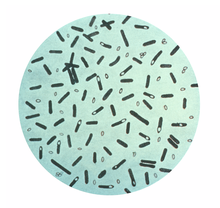Clostridium botulinum
| Clostridium botulinum | |
|---|---|
 |
|
| Clostridium botulinum stained with gentian violet. | |
| Scientific classification | |
| Domain: | Bacteria |
| Phylum: | Firmicutes |
| Class: | Clostridia |
| Order: | Clostridiales |
| Family: | Clostridiaceae |
| Genus: | Clostridium |
| Species: | C. botulinum |
| Binomial name | |
|
Clostridium botulinum van Ermengem, 1896 |
|
Clostridium botulinum is a Gram-positive, rod-shaped, anaerobic, spore-forming, motile bacterium with the ability to produce the neurotoxin botulinum. The botulinum toxin can cause a severe flaccid paralytic disease in humans and other animals and is the most potent toxin known to mankind, natural or synthetic, with a lethal dose of 1.3–2.1 ng/kg in humans.
C. botulinum is a diverse group of pathogenic bacteria initially grouped together by their ability to produce botulinum toxin and now known as four distinct groups, C. botulinum groups I-IV. C. botulinum groups I-IV, as well as some strains of Clostridium butyricum and Clostridium baratii, are the bacteria responsible for producing botulinum toxin.
C. botulinum is responsible for foodborne botulism (ingestion of preformed toxin), infant botulism (intestinal infection with toxin-forming C. botulinum), and wound botulism (infection of a wound with C. botulinum). C. botulinum produces heat-resistant endospores that are commonly found in soil and are able to survive under adverse conditions.
C. botulinum is commonly associated with bulging canned food; bulging, misshapen cans are due to an internal increase in pressure caused by gas produced by the bacteria.
C. botulinum is a Gram-positive, rod-shaped, spore-forming bacterium. It is an obligate anaerobe, meaning that oxygen is poisonous to the cells. However, C. botulinum tolerates traces of oxygen due to the enzyme superoxide dismutase, which is an important antioxidant defense in nearly all cells exposed to oxygen.C. botulinum is only able to produce the neurotoxin during sporulation, which can only happen in an anaerobic environment. Other bacterial species produce spores in an unfavorable growth environment to preserve the organism's viability and permit survival in a dormant state until the spores are exposed to favorable conditions.
...
Wikipedia
